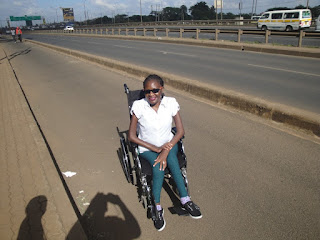Marriage In The Traditional African Society
I
am honoured to share the findings of the interactive sessions's
research I have been carrying out about marriage and disability. This
is a very sensitive topic hence labelled “grey area” in social
research. It has taken me months to gather/collect the data,
connecting to the target population has really been a challenging
moment, using the phone to assure them that their privacy will be the
most and vital aspect of consideration was not an easy thing to do.
Using the people known to me as translators was another tricky thing
especially when the responded were talking in different dialects from
mine. The respondents were willing to participate on condition that
their identity is not reveled at all! I had to give my real identity
besides the confession that it is just for the sake of awareness
creation and not meant to be used to intimidate any party. Am glad
they trusted me and gave the information as per my request.
It
is essential for those involved in this type of research to recognize
their ethical obligation to prevent any harm to the participants,
especially as the topic of research are of a sensitive nature.
Consent to take part should be gained from all participants and all
participants are supposed to be assured of their anonymity and free
to withdraw from participation, or withdraw any previously gained
data, at any time. This is the reason why we dont allow the use of
names while sharing these feedbacks. Conducting interviews through
translators raises the most concerns for the research process when
carrying out a study on such a sensitive topic.
The
main risk is that the information obtained through translators may
not be accurate. Inevitably, the direct translation of certain words,
phrases or concepts often does not exist, so the translators has to
re-phrase the question to obtain the information required. Such
limitations highlight the importance of careful preparation for
interviewing. The fact that the researcher may have a feature to
identify with the respondents then this makes them to be reluctant in
exploring especially the negative practices and beliefs relating to
the issue may be for the fear of not wanting to hurt the feelings of
the researcher, some respondents may choose not to give all the deep
answers especially if they are sensitive and personal as well, the
modernization and civilization factor is also a big challenge since
most of the things are looked at from the civilized approach. Time
that is allocated for such a study should not limit the researcher
from being able to explore everything.
There
are a number of rites of passage that mark the life of an individual
in the African societies, they come one after the other following a
specific order in life.
These
rites are: the rite of birth,
adulthood,
marriage,
eldership,
and ancestorship.
According to Dominique Meekers in the book “The Process of Marriage
in African Societies: A Multiple Indicator Approach” in African
societies, marriage is seen as a complex institution that is made up
of several stages, most of these stages are marked by different rites
as per the requirements of the community in question.
Marriage
is a significant aspect of the African culture. As other studies have
indicated or speculated, it was found that disability is damaging to
marriages, both existing marriages and for the marriage prospects of
unmarried individuals. The arranged marriage of one participant was
cancelled when his future in-laws found out he had impregnated a
disabled woman. “All arrangements for my marriage had been done in
the village where I used to work, then the whole village came to know
that I had a woman in the urban and she was disabled so, the marriage
could not take place” (Male 1 told me on phone). “My uncle forced
me to stay at an old man’s house claiming that I was lucky to get
him” (Female “S” lamented in tears from Lugari on phone).

Comments
Post a Comment